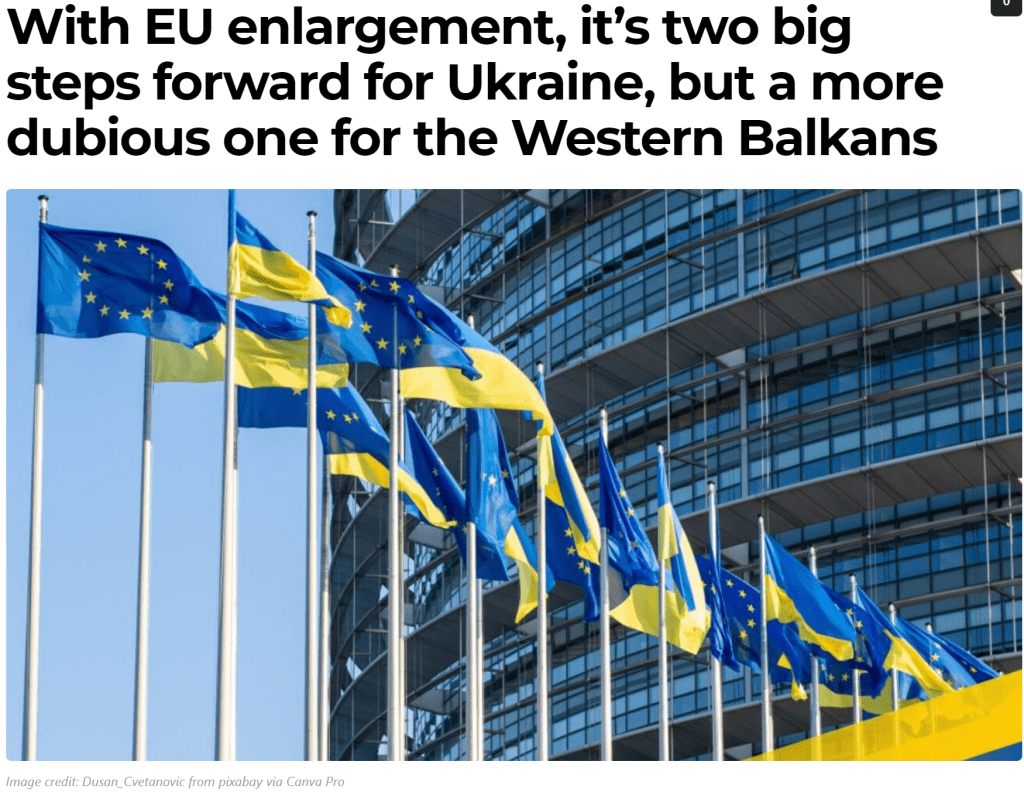
CEPS: With EU enlargement, it’s two big steps forward for Ukraine, but a more dubious one for the Western Balkans
2024-03-14 | EU integration, Expert publicationsby Michael Emerson, originally published HERE.
The EU’s enlargement process has been the constant talk of the town since the European Commission delivered its annual Enlargement Package in November 2023. There have been three significant developments of real significance to acknowledge, two on Ukraine which are excellent, the third concerning the Western Balkans which is not quite right yet and requires some additional work.
The first was the European Council’s decision to open accession negotiations with Ukraine. The second was the agreement on the EUR 50 billion aid package for Ukraine, agreed unanimously when Viktor Orban unexpectedly decided not to wield his veto – a result that highlights the merits of sustained diplomacy, rather than condemning Hungary’s prime minister as a paid-off pariah.
The third is the Commission proposal for a Growth Plan for the Western Balkans, with fresh financial incentives offered for reform measures, but – worryingly – with no apparent linkage to the formal enlargement methodology. This is an error that should be rectified, sooner rather than later.
With the US dithering over Ukraine, the EU needs to step up
To its credit, the EU is doing the maximum of what it has the competence to do to support Ukraine. The two measures for Ukraine are hugely significant. But then the EU – and essentially its Member States – have not been able to deliver promised ammunitions, at a time when the weird workings of the Republicans in the US House of Representatives have reneged on supplying USD 60 billion of weaponry. President Biden is still pushing for congressional support, but this is yet to happen.
The EU and US supplying equivalent resources to Ukraine, both civilian and military, appeared to be a sound complementarity effort, that is until the US backed off. And the costs of this are already painfully apparent with the fall of Avdiivka as defending Ukrainian soldiers simply ran out of ammo, making it impossible for them to hold the town.
So, the story thus becomes something immeasurably bigger than just the EU’s formal enlargement process, namely whether the EU will finally develop serious military capabilities of its own. Generations of EU ‘architects’ have been waiting for the moment when a devastating set of circumstances would overcome conventional conservatism and see the emergence of this final missing block in the EU system beyond the single market and euro.
It remains to be seen whether Ursula Von Der Leyen’s ambition to make defence a hallmark of a second term as the Commission President will turn out to be something measuring up to the needs of the day, or instead be only modest incrementalism – a little bit more of the typical ‘too little, too late’ mentality that we’ve come to expect from the EU.
An incomplete Growth Plan for the Western Balkans
Regarding the Growth Plan for the Western Balkans there is a partial resemblance to our CEPS ‘new idea’ for radically reforming enlargement through the adoption of a ‘Staged Accession’ process. The broad idea, shared with the Growth Plan, is that the financial and institutional benefits of membership should be built up in stages, rather than having to wait for everything all at once on accession day.
A crucial difference, however, is that whereas the proposed Staged Accession methodology would be integral to the formal enlargement process with its opening and closing of ‘chapters’ and ‘clusters’, the Growth Plan has no such link to it. This weakness could still be overcome by specifying its conditions in terms of requirements for improved ratings for selected chapters.
Other related reforms should see a switch to qualified majority voting (QMV), ending the absurd and highly damaging practice of seeking unanimity for every little step in the opening or closing of chapters and clusters (of which the Bulgarian blockages of North Macedonia have been the most notorious example). This switch to QMV can be done by a simple Council decision, without treaty change or ratification procedures, but crucially demands just the political will of Member States.
Big but unbalanced and vulnerable progress
The recent decisions to open accession negotiation with Ukraine, accompanied by major financial support, are in themselves excellent, but now they risk being totally undermined by the US possibly deciding to cut its own supply of military equipment to Kyiv. Thus, it must fall to the EU and its Member States to procure ammunition for Ukraine any way it can, from anywhere it can, and do so now, immediately, without hesitation, to build back Ukraine’s basic military capabilities. Without this help from the EU, Ukraine’s accession negotiations will mean nothing in the face of continued Russian onslaught.
Besides Ukraine, the Commission’s Growth Plan for the Western Balkans is good for as far as it goes but needs to be strengthened with an explicit link to the formal accession process, thus bringing it closer to CEPS’ own proposal for Staged Accession. Without this, today’s total lack of credibility in the Western Balkans regarding Member States’ declared intentions will not be overcome, the real incentives to reform in the region will remain dim, and so the project will remain ineffective.
The recent developments regarding enlargement should indeed be broadly welcomed – but much more work needs to be done to reform the entire process, and alongside this, basic political commitments from the EU and its Member States need to be honoured.
This Expert Commentary is part of a series that will be published prior to the CEPS Ideas Lab on 4-5 March 2024 to showcase some of the innovative ideas we’ll be rigorously debating with our participants. More info can be found on the official Ideas Lab 2024 website.
